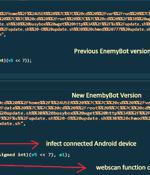Security News

A nascent Linux-based botnet named Enemybot has expanded its capabilities to include recently disclosed security vulnerabilities in its arsenal to target web servers, Android devices, and content management systems. "The malware is rapidly adopting one-day vulnerabilities as part of its exploitation capabilities," AT&T Alien Labs said in a technical write-up published last week.

Hackers are showing an increased interest in the Windows Subsystem for Linux as an attack surface as they build new malware, the more advanced samples being suitable for espionage and downloading additional malicious modules. WSL-based malware samples discovered recently rely on open-source code that routes communication through the Telegram messaging service and gives the threat actor remote access to the compromised system.

A new ransomware named 'Cheers' has appeared in the cybercrime space and has started its operations by targeting vulnerable VMware ESXi servers. We have seen many ransomware groups targeting the VMware ESXi platform in the past, with the most recent additions being LockBit and Hive.

Tails developers have warned users to stop using the portable Debian-based Linux distro until the next release if they're entering or accessing sensitive information using the bundled Tor Browser application. "We recommend that you stop using Tails until the release of 5.1 if you use Tor Browser for sensitive information," the Tails developers warned.

Microsoft has sounded the alarm on DDoS malware called XorDdos that targets Linux endpoints and servers. Over the last six months, Microsoft threat researchers say they've witnessed a 254 percent spike in the malware's activity.

Kali Linux 2022.2 released: Desktop enhancements, tweaks for the terminal, new tools, and more!Offensive Security has released Kali Linux 2022.2, the latest version of its popular penetration testing and digital forensics platform. VMware issues critical fixes, CISA orders federal agencies to act immediatelyVMware has released patches for a privately reported critical vulnerability in VMware's Workspace ONE Access, VMware Identity Manager, vRealize Lifecycle Manager, vRealize Automation, and VMware Cloud Foundation products, and is urging administrators to patch or mitigate immediately, because "The ramifications of this vulnerability are serious."

Another malicious Python package has been spotted in the PyPI registry performing supply chain attacks to drop Cobalt Strike beacons and backdoors on Windows, Linux, and macOS systems. PyPI is a repository of open-source packages that developers can use to share their work or benefit from the work of others, downloading the functional libraries required for their projects.

A Linux botnet malware known as XorDdos has witnessed a 254% surge in activity over the last six months, according to latest research from Microsoft. The trojan, so named for carrying out denial-of-service attacks on Linux systems and its use of XOR-based encryption for communications with its command-and-control server, is known to have been active since at least 2014.

A stealthy and modular malware used to hack into Linux devices and build a DDoS botnet has seen a massive 254% increase in activity during the last six months, as Microsoft revealed today. XorDDoS is known for targeting a multitude of Linux system architectures, from ARM to x64, and compromising vulnerable ones in SSH brute-force attacks.

The rules of Pwn2Own are somewhat strange, given that some entrants may end up not actually competing at all. The Tesla hackers, plus the browser and virtualisation entrants, will all definitely get a turn, because they're the only competitors in their categories.